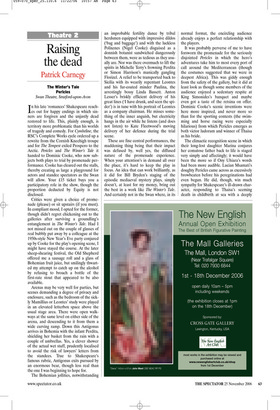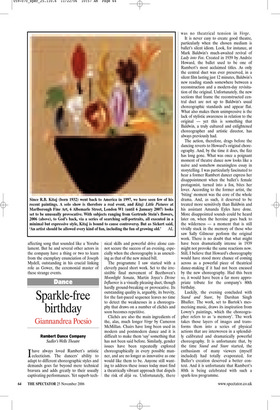Raising the dead
Patrick Carnegy
The Winter’s Tale Pericles
Swan Theatre, Stratford-upon-Avon
In his late ‘romances’ Shakespeare reaches out for happy endings in which sinners are forgiven and the unjustly dead restored to life. This, plainly enough, is territory more problematic than his worlds of tragedy and comedy. For Cymbeline, the RSC’s Complete Works cycle ordered up a rewrite from the Cornish Kneehigh troupe and for The Tempest exiled Prospero to the Arctic. Pericles and The Winter’s Tale it handed to Dominic Cooke, who now subjects both plays to trial by promenade performance. Cooke has cleared out the stalls, thereby creating as large a playground for actors and standee spectators as the Swan will allow. Your £15 ticket buys you a participatory role in the show, though the proportion deducted by Equity is not disclosed.
Critics were given a choice of promenade (please) or sit upstairs (if you must). In compliant mood, I opted for the former, though didn’t regret chickening out to the galleries after surviving a groundling’s entanglement in The Winter’s Tale. Had I not missed out on the couple of glasses of real bubbly put away by a colleague at the 1950s-style New Year’s Eve party conjured up by Cooke for the play’s opening scene, I might have stayed the course. At the later sheep-shearing festival, the Old Shepherd offered me a sausage roll and a glass of Bohemian fruit juice, but smilingly thwarted my attempt to catch up on the alcohol by refusing to broach a bottle of the first-rate stout that appeared to be also available.
Arenas may be very well for parties, but scenes demanding a degree of privacy and enclosure, such as the bedroom of the sickly Mamillius or Leontes’ study were played in an elevated letterbox space above the usual stage area. There were open walkways at the same level on either side of the arena, and descending to it from them a wide curving ramp. Down this Antigonus arrives in Bohemia with the infant Perdita, shielding her basket from the rain with a couple of umbrellas. Yes, a clever shower of the actual wet stuff, prudently localised to avoid the risk of lawyers’ letters from the standees. True to Shakespeare’s famous rubric, Antigonus exits pursued by an enormous bear, though less real than the one I was beginning to hope for.
The Bohemian jollities, notwithstanding an improbable fertility dance by tribal herdsmen equipped with impressive dildos (‘bag and baggage’) and with the luckless Polixenes (Nigel Cooke) disguised as a donnish botanist sandwiched dangerously between them, were as tedious as they usually are. Nor was there overmuch to lift the spirits in Michelle Terry’s frowning Perdita or Simon Harrison’s manically gangling Florizel. A relief to be transported back to Sicilia with its wearily repentant Leontes and his fur-coated minder Paulina, the arrestingly bossy Linda Bassett. Anton Lesser’s briskly efficient delivery of his great lines (‘I have drunk, and seen the spider’) is in tune with his portrait of Leontes as a company chairman. He misses something of the inner anguish, but electricity hangs in the air while he listens (and does not listen) to Kate Fleetwood’s moving delivery of her defence during the trial scene.
These are fine central performances, the maddening thing being that their impact was defused by, well yes, the diffused nature of the promenade experience. When your attention’s in demand all over the place, it’s hard to keep the play in focus. An idea that can work brilliantly, as it did for Bill Bryden’s staging of the episodic mediaeval mystery plays, simply doesn’t, at least for my money, bring out the best in a work like The Winter’s Tale. And certainly not in the Swan where, in its normal format, the encircling audience already enjoys a perfect relationship with the players.
It was probably perverse of me to have forsworn the promenade for the seriously disjointed Pericles in which the hero’s adventures take him to most every port of call around the Mediterranean (though the costumes suggested that we were in deepest Africa). This was giddy enough from the safety of the gallery, but it did at least look as though some members of the audience enjoyed a sedentary respite at King Simonides’s banquet and maybe even got a taste of the retsina on offer. Dominic Cooke’s scenic inventions were here more inspired, and never more so than for the sporting contests (the swimming and horse racing were especially hilarious) from which Pericles emerges as both victor ludorum and winner of Thaisa as his bride.
The climactic recognition scene in which their long-lost daughter Marina conjures her comatose father back to life is staged very simply and affectingly; it would have been the more so if Ony Uhiara’s words had been more audible. Lucian Msamati’s doughty Pericles came across as excessively browbeaten before his peregrinations had even begun. He did, though, win much sympathy for Shakespeare’s ill-drawn character, responding to Thaisa’s seeming death in childbirth at sea with a deeply affecting song that sounded like a Yoruba lament. But he and several other actors in the company have a thing or two to learn from the exemplary enunciation of Joseph Mydell, outstanding in his crucial linking role as Gower, the ceremonial master of these strange events.



























































































 Previous page
Previous page